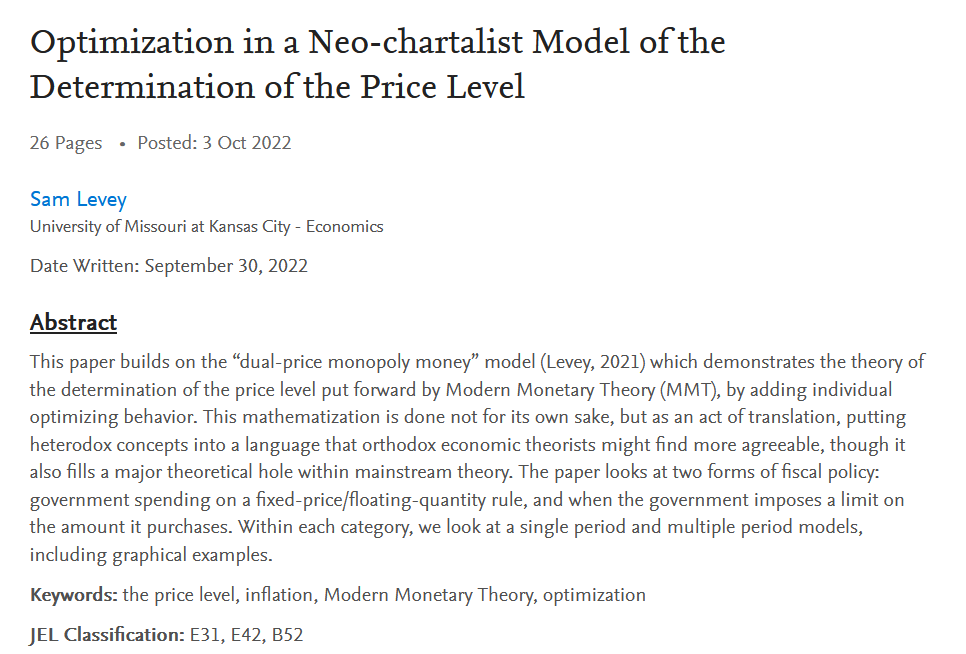
Assistant Professor at Illinois College. MMT and heterodox macro & political economy. Mobilization economics. Mastodon: @samhlevey@econtwitter.net
How to get URL link on X (Twitter) App



 MMT says that the price level should be based on the prices that the government pays when it spends. From @wbmosler, "every time the government pays more for the same thing, it is redefining its currency downward." In this paper, I build a mathematical model of that mechanism.
MMT says that the price level should be based on the prices that the government pays when it spends. From @wbmosler, "every time the government pays more for the same thing, it is redefining its currency downward." In this paper, I build a mathematical model of that mechanism. 

 The theory comes from Modern Monetary Theory (MMT), and this paper is a follow-up to an earlier paper that had mathematized this mechanism, which was here: levyinstitute.org/publications/m…. What the new draft adds is that it uses orthodox intertemporal optimization to drive behavior. /2
The theory comes from Modern Monetary Theory (MMT), and this paper is a follow-up to an earlier paper that had mathematized this mechanism, which was here: levyinstitute.org/publications/m…. What the new draft adds is that it uses orthodox intertemporal optimization to drive behavior. /2


 Supply is constrained so higher prices don't elicit more output; you would get higher prices only because sellers are exploiting their position of privilege to extract rents from buyers. For necessary goods, distribution shouldn't be based on who can pony up the most.
Supply is constrained so higher prices don't elicit more output; you would get higher prices only because sellers are exploiting their position of privilege to extract rents from buyers. For necessary goods, distribution shouldn't be based on who can pony up the most.


https://twitter.com/JoMicheII/status/1530199032630497280Here is what Jo is pointing us towards, and he suggests that the first answer is an obvious 'yes,' while the second question avoids more important issues.
https://twitter.com/JoMicheII/status/1530199221432877056?s=20&t=8e_vcueyH_6VpP7IoU18UQ


https://twitter.com/ne0liberal/status/1518996800295907328What MMTers have said is this: taxes function to prevent inflation. This is a descriptive statement. Not a recommendation.





 The first is a simplified world that you might argue is MMT's theoretical 'base case.' The government only issues currency, not bonds, and it hires anybody who wants to work, i.e. a Job Guarantee. In this case, gov spending will be determined by the markets, according to 2/8
The first is a simplified world that you might argue is MMT's theoretical 'base case.' The government only issues currency, not bonds, and it hires anybody who wants to work, i.e. a Job Guarantee. In this case, gov spending will be determined by the markets, according to 2/8 

https://twitter.com/R2Rsquared/status/1362386627616780289?s=20/1 But first, if you're an economist, where can you go to find MMT literature, so that you can read before forming an opinion and back your commentary with citations? Here's a resource: deficitowls.wixsite.com/mmt4mainstream… /2